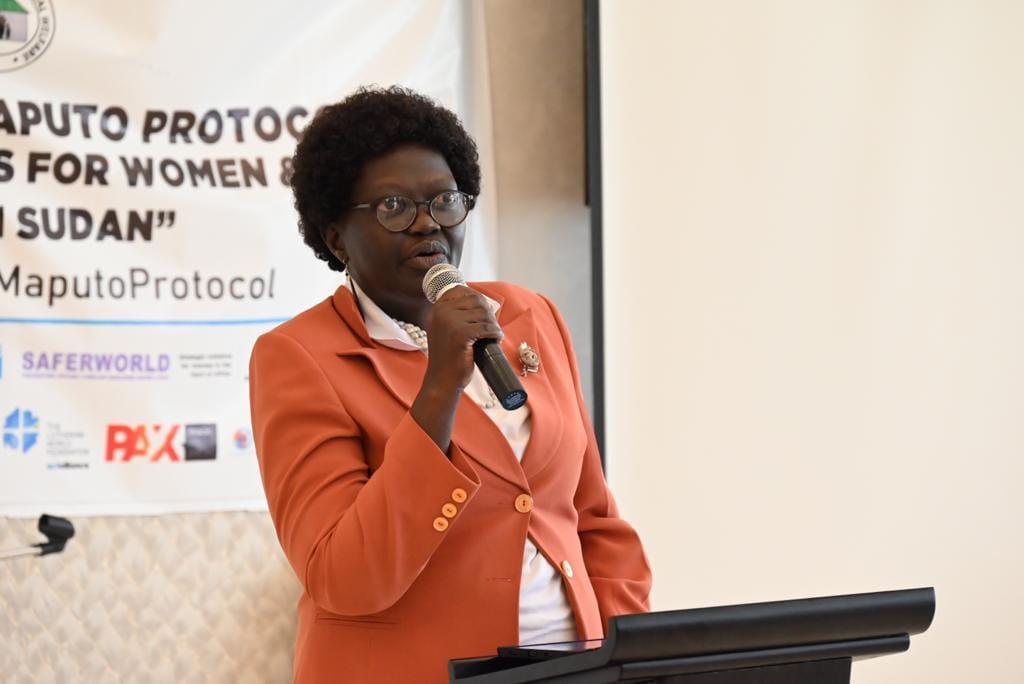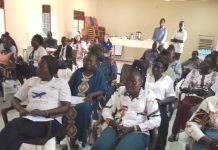Matik Kueth
Africa-Press – South-Sudan. The government exuded confidence in implementing the famous Maputo Protocol by developing a roadmap to ensure that gender equality is practiced in the country.
Speaking during the launch of the protocol on Tuesday, the Minister of Gender, Child, and Social Welfare, Aya Benjamin Warrille, said the ministry will ensure full implementation of the protocol to ensure that women and girls find social belonging as envisaged in the theme.
“We have taken a concrete step to transform this provision into a tangible improvement in the lives of women and girls across the nation by coming up with a roadmap that guides us through this process,” Aya said.
“We have divided the roadmap into two phases, considering the implementation. Phase one involves the deposition of the article of ratification, which is already done, and secondly, raising awareness on the Maputo protocol on radio shows across the country,” she added.
According to her, the ministry shall draft a national master plan that will engage partners and stakeholders in implementing gender-related policies to culminate gender equality in South Sudan.
“The ministry of gender, child, and social welfare will engage various stakeholders to develop and implement a national strategy action plan that includes all gender-related policies that will combat negative gender practices and inequality in South Sudan,” she said.
However, Jemma Nunu Kumba, Speaker of the Reconstituted Transitional National Legislative Assembly (RTNLA), called on the government and partners to put effort into empowering women and girls in South Sudan.
“I would like to call upon the actors, including arms of government, donors, partners, and civil society, to join hands to do more on women’s and girls empowerment instruments,” Nunu stated.
She further noted that creating public awareness about the Maputo Protocol would ease the stress that various communities in South Sudan are under.
“It is not going to be a smooth journey; we are going to meet with a lot of resistance. We are talking about a culture that has been there for centuries, and changing it will not be easy,” she added.
“So, we should be prepared for that and make them understand the importance of this protocol to society.”
The African Union Ambassador to South Sudan, Prof. Joram Mukama urged South Sudan’s government to work closely with civil society organizations and other partners to ensure a comprehensive approach is realised in the country.
“Maputo Protocol is a living document for the women and girls in South Sudan. I therefore encourage the government to engage with partners, civil society, and other stakeholders to ensure the inclusivity approach is understood in the country,” Mukama said.
“By working together, South Sudan can leverage the collective extraditions and resources available to develop proper strategies, monitor progress, and address the implementation of the gaps.”
The AU envoy added that this would help the RTGNU to overcome challenges in gender disparities and create a society where all individuals, regardless of gender, can thrive in the nation’s development.
Meanwhile, UN women’s country representative, Rukeya Mohammed, applauded South Sudan for completing the ratification of the Maputo Protocol.
South Sudan became the 44th country out of 55 to ratify the protocol on women’s rights on the continent.
“South Sudan has really done a great job for the ratification of the protocol to the African Charter on Human and Peoples’ Rights on the Rights of Women in Africa, becoming the 44th country to ratify the protocol.”
“It was not easy, about 11 countries have not yet ratified the Protocol, congratulations on completing the process,” Rukeya said.
On February 24, 2023, President Salva Kiir signed four international conventions into law, including the International Covenant on Economic, Social, and Cultural Rights and the Protocol to the African Charter on the Human and Peoples’ Rights of Women in Africa.
The Maputo Protocol to the African Charter on Human and Peoples’ Rights on the Rights of Women in Africa [commonly known as the Maputo Protocol] was adopted on July 11, 2003, in the Mozambique capital of Maputo by the African Union to uphold equal rights for women and girls.
Source: The City Review South Sudan
For More News And Analysis About South-Sudan Follow Africa-Press






